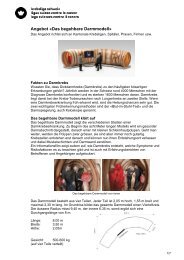Cancer Research in Switzerland - Krebsliga Schweiz
Cancer Research in Switzerland - Krebsliga Schweiz
Cancer Research in Switzerland - Krebsliga Schweiz
You also want an ePaper? Increase the reach of your titles
YUMPU automatically turns print PDFs into web optimized ePapers that Google loves.
Based on these qualitative results, a sample of 470 oncology<br />
patients were surveyed us<strong>in</strong>g a written questionnaire.<br />
In the survey, a behavioural model that had been developed<br />
was tested. This model expla<strong>in</strong>s under what conditions<br />
patients will become <strong>in</strong>volved for their safety <strong>in</strong> hospital.<br />
The results show that many patients are concerned<br />
for their safety and errors <strong>in</strong> their care. A vast majority<br />
agrees that they can contribute to the prevention of errors.<br />
Patients themselves describe their capabilities as develop<strong>in</strong>g<br />
<strong>in</strong> a learn<strong>in</strong>g process alongside the treatment<br />
course, <strong>in</strong> which they acquire knowledge and skills concern<strong>in</strong>g<br />
what aspects of care to monitor, what to communicate<br />
to care providers and how they can engage for their<br />
safety. Patients acknowledge the benefit of error monitor<strong>in</strong>g<br />
and report<strong>in</strong>g but perceive the process of notify<strong>in</strong>g<br />
staff of potential errors often as unfamiliar and uncomfortable.<br />
Behavioural control and subjective norms are the<br />
key elements that expla<strong>in</strong> whether patients communicate<br />
their perceptions of safety problems. Oncology nurses<br />
perceive <strong>in</strong>volvement of patients as their core expertise.<br />
They share a general positive attitude towards the approach,<br />
even if communication about safety often is a<br />
challenge for them. Nurses sensitively apply different<br />
strategies to get patients <strong>in</strong>volved through <strong>in</strong>formation<br />
and motivation. However, they also see room for improvement,<br />
particularly <strong>in</strong> the cultural implementation <strong>in</strong> hospitals:<br />
“Patients need to experience from the beg<strong>in</strong>n<strong>in</strong>g that<br />
it is appreciated that they ask questions or notify us that<br />
someth<strong>in</strong>g is not correct”.<br />
Based on these results, dist<strong>in</strong>ct recommendations can be<br />
made to <strong>in</strong>volve patients <strong>in</strong> the prevention of errors while<br />
tak<strong>in</strong>g their <strong>in</strong>dividual situation <strong>in</strong>to account. To be successful,<br />
it is crucial that cl<strong>in</strong>ical staff <strong>in</strong>forms, motivates<br />
and supports patients.<br />
Project coord<strong>in</strong>ator<br />
PD Dr. David Schwappach, MPH<br />
Stiftung für Patientensicherheit<br />
Asylstrasse 77<br />
CH-8032 Zürich<br />
Phone +41 (0)43 243 76 70<br />
schwappach@patientensicherheit.ch<br />
Stiefel Friedrich | Evaluation of <strong>in</strong>dividual psychotherapy<br />
for emotionally distressed cancer patients:<br />
A randomized controlled trial (OCS 01847-02-2006)<br />
In order to evaluate the role psychotherapy can play <strong>in</strong> the<br />
oncology sett<strong>in</strong>g, <strong>in</strong> the context of this study psychological<br />
support was proposed to every new patient treated<br />
between 2006 and 2009 by the Oncology Service of the<br />
University Hospital Lausanne (CHUV).<br />
Among the 2,000 patients approached, about half of<br />
them had been excluded based on the criteria def<strong>in</strong>ed <strong>in</strong><br />
the study, ma<strong>in</strong>ly because of organizational reasons (liv<strong>in</strong>g<br />
too far away from the hospital, <strong>in</strong>tensive treatments,<br />
etc.), age > 75, advanced disease or language difficulties.<br />
A quarter of the patients approached (n=530) refused to<br />
participate <strong>in</strong> the study; of participat<strong>in</strong>g patients (n=419),<br />
about half of them (n=190) wished to benefit from psychological<br />
support, and the other half, who did not desire<br />
psychological support, agreed to be regularly evaluated<br />
with regard to their psychological state. Patients who de-<br />
sired support received either 4 or 16 sessions of brief psychotherapy<br />
and were regularly evaluated for a period of<br />
a year with regard to their psychological symptoms and<br />
quality of life, as this was the case for participat<strong>in</strong>g patients<br />
who did not wish to have this support.<br />
The results showed that for a lot of patients, it is difficult<br />
to organize or to accept psychological support; about<br />
20 % of patients <strong>in</strong>cluded <strong>in</strong> the study, or 10 % of the total<br />
population approached, desired psychological support;<br />
patients motivated to receive support were <strong>in</strong> psychological<br />
distress; two-thirds of participat<strong>in</strong>g patients<br />
showed signs of important emotional detachment with regard<br />
to the efficacy of psychotherapeutic support. Data<br />
analysis is still ongo<strong>in</strong>g.<br />
We conclude 1) that <strong>in</strong> the oncology sett<strong>in</strong>g, psychological<br />
support should be proposed proactively, for example<br />
through different modes of communication (telephone,<br />
e-mail), and more flexibly, for example by consultations at<br />
a patient’s home; 2) that at least 10 % of patients wish to<br />
benefit from psychological support at the beg<strong>in</strong>n<strong>in</strong>g of<br />
treatment; 3) that patients <strong>in</strong> psychological distress were<br />
also those who desired support and that systematic<br />
screen<strong>in</strong>g of patients <strong>in</strong> need of support, for example by<br />
means of a questionnaire, may probably not be necessary;<br />
and 4) that because of the emotional detachment of patients<br />
with cancer, evaluation of the effects of psychotherapies<br />
should use other methods than those utilized up<br />
to now.<br />
This study has produced important results that contribute<br />
to the conceptualization and implementation of psychological<br />
support <strong>in</strong> oncology centres and to adjust<strong>in</strong>g scientific<br />
<strong>in</strong>vestigation of this doma<strong>in</strong>.<br />
Project coord<strong>in</strong>ator<br />
Prof. Dr Friedrich Stiefel<br />
Service de psychiatrie de liaison<br />
Centre hospitalier universitaire vaudois (CHUV)<br />
Bugnon 44<br />
CH-1011 Lausanne<br />
Phone +41 (0)21 314 10 90<br />
Fax +41 (0)021 314 10 86<br />
frederic.stiefel@chuv.ch<br />
Stiefel Friedrich | Effects of communication skills<br />
tra<strong>in</strong><strong>in</strong>g on oncology cl<strong>in</strong>icians’ communication styles<br />
and defense mechanisms (KLS 02035-02-2007)<br />
The importance of the quality of exchange between patient<br />
and physician has been recognised for several decades.<br />
Concern<strong>in</strong>g the patient, it has been demonstrated<br />
that efficient communication can <strong>in</strong>fluence treatment adherence<br />
and improve quality of life and satisfaction with<br />
regard to care. Concern<strong>in</strong>g the physician, it is known that<br />
efficient communication <strong>in</strong>creases job satisfaction and<br />
reduces stress and/or burnout.<br />
Given the call for patient-centred medic<strong>in</strong>e, all doma<strong>in</strong>s of<br />
health care are <strong>in</strong>vited to pay attention to communication<br />
challenges. This is particularly true of oncology, which implies<br />
break<strong>in</strong>g bad news and because of the social representations<br />
of cancer.<br />
183

















